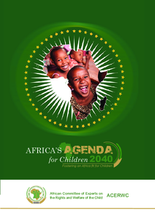Introduction to the Agenda
Africa’s Agenda for Children: Fostering an Africa Fit for Children elaborates on the vision of Agenda 2063 in respect of children. In doing so, this Agenda takes cognisance of the elucidation in Agenda 2063 (paragraph 53) that ‘African children shall be empowered through the full implementation of the African Charter on the Rights of the Child’. By nurturing and nourishing its children, the present generation of Africans will promote the growth of the continent and secure its future.
By taking stock and prioritising future action, this document develops Africa’s agenda for children for the coming 25 years based on the lessons learnt from the past 25 years. By 2040, the rights of Africa’s children should be firmly protected, with full effect being given to the priorities in this Agenda. This is the Africa we aspire to.
The Agenda sets out ten aspirations, to be achieved by 2040, against a brief background contextualising the particular issue. It proceeds to identify action steps, mostly, but not exclusively, to be taken by States, for the first period of the five-phased 25-year journey ahead.
Aspirations within the Agenda most crucial to children's care in Africa include:
- The adoption of an effective child-friendly national legislative, policy and institutional framework which supports the best interests of children by all State parties;
- Ensure no child is born stateless in Africa by providing free and compulsory birth registration so that all children, including those outside family care, are counted;
- Most vulnerable children are easily identified and prioritized so that social protection is provided to children most in need of care;
- The detainment of children is avoided unless necessary, at which point institutions have rehabilitation and reintegration as the main objective from the point a child arrives. Children should be detained separately from adults and should not be incarcerated with their mothers;
- Processes for child participation are in place, and children have the right to be consulted on decisions that affect them and their care.

